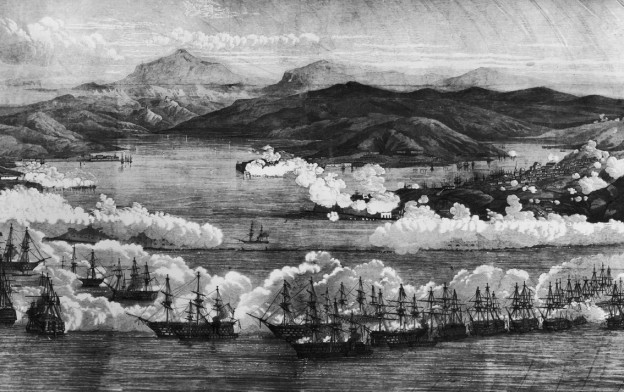During the 1850s, Russia fought a bloody war against Britain, France, and other nations. One o the larger battlegrounds was Sevastopol. Here the Russia troops blockaded the harbor.
Today, knowledge about the war is reduced to a poem written by Alfred Lord Tennyson, “The Charge of the Light Brigade,” and a story if a British nurse, Florence Nightingale.
However, looking back at the real history of the Crimean War helps explain Russia’s cultural ties to the conflict the region is experiencing today. The professor of naval history at King’s College in London, Andrew Lambert, discussed that very history with Here & Now.
“For the Russians to give [Crimea] to the Ukraine would be like giving Pearl Harbor to the Japanese today,” Lambert says. “It hits every wrong note in the psyche of the Russians. They remember the past in ways that we in the West simply do not comprehend. For them it’s like yesterday.”
On Russia and Britain as former rival superpowers
“In the 1840s, 1850s, Britain and America are not the chief rivals; it’s Britain and Russia. Britain and Russia are rivals for world power, and Turkey, the Ottoman Empire, which is much larger than modern Turkey — it includes modern Romania, Bulgaria, parts of Serbia, and also Egypt and Arabia — is a declining empire. But it’s the bulwark between Russia, which is advancing south and west, and Britain, which is advancing east and is looking to open its connections up through the Mediterranean into its empire in India and the Pacific. And it’s really about who is running Turkey. Is it going to be a Russian satellite, a bit like the Eastern Bloc was in the Cold War, or is it going to be a British satellite, really run by British capital, a market for British goods? And the Crimean War is going to be the fulcrum for this cold war to actually go hot for a couple of years, and Sevastopol is going to be the fulcrum for that fighting.”
What happened in the Crimea War
“The Russians get too deep into Turkey. The Turks attack them. The Russians counter-attack, using their fleet from Sevastopol to sink the Turkish navy. And at this point, the British say, That’s it, we’re in this war. We’re going to protect Turkey from the Russians.”
“The strategy of the war was set by the British, and essentially, it’s about attacking and destroying all of Russia’s naval bases. The main base in the Black Sea is at Sevastopol, there’s a great base at Kronstadt, just outside St. Petersburg, and there are bases at Archangel on the White Sea and Petropavlovsk on the Pacific. And in all four theaters, British and French forces try and attack those naval bases and destroy them. But it’s the Anglo-French invasion of the Crimea in September 1854, attempting to capture and destroy Sevastopol, which becomes the epicenter of the fighting part of the war.”
On why retaining Crimea is so important to Russia
“People have always attacked and invaded Russia. The Golden Horde of Genghis Khan completely destroyed medieval Russia. Napoleon invaded, Hitler invaded, the Swedes invaded, the Poles invaded, the British invaded. The history of Russia is about being invaded by dangerous, aggressive, foreign countries, and their strategy is to build a buffer zone of protective zones through which people have to advance, and the Ukraine has been one of those for 300 years, and hope that they can avoid being conquered by what seems to be an endless litany of aggressive foreign conquerors.”
.
